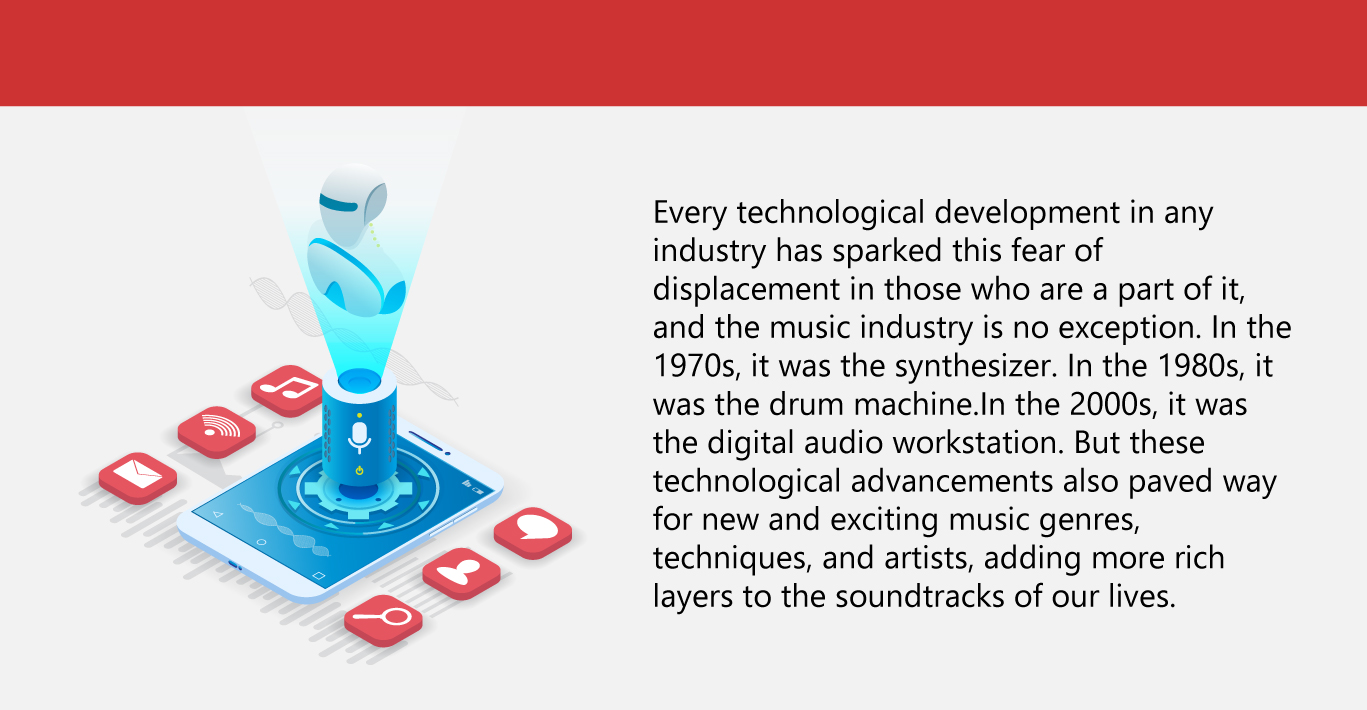Connect With Us


From creating hyper-personalized playlists to mastering tracks, discover how AI is transforming how we consume and create music.
“Music is the language of the spirit,” wrote Kahlil Gibran. It’s a pulsing beat that drives your morning workout, a plaintive folk tune to console you on a lonely night, a dance track to bop to in the car. We love lyrics and hooks, bridges and riffs—the highs and lows of the human experience set to music.
In this tech-driven age, even this most personal of preferences—what we listen to—is being powered by artificial intelligence. How do music producers use these high-tech tools today to create the hottest hits? How have apps like Spotify changed how we listen to and discover new music? In this article, we explore how AI is transforming the soundtrack of our lives.
The Illiac Suite
In 1957, Lejaren Hiller and Leonard Isaacson, professors at the University of Illinois at Urbana–Champaign, made history by programming the ILLIAC I computer to compose a piece of music. The computer’s output was translated into musical notation to be performed by a string quartet. The piece was named the Illiac Suite, a nod to the computer on which it was composed.
“This forever changed how people worldwide thought about music and its relationship to science,” Scott Wyatt, professor emeritus of composition-theory at the University of Illinois at Urbana–Champaign, shared in an email with The Daily Illini. Wyatt was also the director of the University’s Experimental Music Studios for 39 years.
“(The composition) initiated widespread interest and development of the use of computers for music and art, computer music, electronic music, and music technology,” Wyatt continued.
More than 60 years later, how has this groundbreaking experiment changed how we create and consume music?
(Also read: AI and Creativity: The Algorithm of Art)
AI and audio-streaming services
It’s a great time to be a music lover, what with millions of songs at our fingertips, thanks to audio-streaming services like Spotify. Launched in 2008, it has 456 million users (including 195 million subscribers) across over 180 markets.
The secret to its success? Harnessing machine learning and AI to enhance the user experience. “Machine learning is at the heart of everything we do at Spotify,” Tony Jebara, VP of engineering and head of machine learning, shared in a presentation at TensorFlow World 2019.
“Machine learning enables us to recommend artists, playlists, and podcasts so that users are active and more likely to subscribe in the long-term,” Jebara continued.
To make hyper-personalized recommendations, Spotify's machine-learning models analyze user information such as listening history, musical choices, playlists, and other interactions.
“Every day, nearly half a trillion events are processed, and the more info our models gather, the smarter they become about making associations between different artists, songs, podcasts, and playlists,” Oskar Stål, VP of Personalization, shared.
To ensure user satisfaction in the long term, the company uses reinforcement learning (RL), a training method that rewards desired behaviors.
“In our case, that reward is our users’ long-term satisfaction with Spotify. RL isn’t about short-term solutions. It’s always playing the long game, Stål explained. “In a general sense, our RL model tries to predict how satisfied our users are with their current experience, and attempts to nudge them toward consuming more fulfilling content in their audio diet to make them happier with the service.”
(Also read: Scents and Science: AI in Creating Fragrances)
AI and the composer
The astronomical rise of computing power has also paved the way for high-tech tools for sound engineers, music producers, and artists. Laborious production tasks can be done faster, giving users more time to nurture their creativity.
One such time-consuming process is audio repair, the process of restoring old or damaged recordings and removing unwanted background noise. Intelligent audio technology from companies like iZotope can speed up a user’s workflow.
“One example is source separation for speech cleanup,” Melissa Misicka, iZotope’s Director of Brand Marketing, shared with Audio Media International. “Our Modules like Dialogue Isolate or De-rustle rely on it to attenuate unwanted sounds like footsteps, bird chirping, or rustle of a mic hidden in clothes. Manual repair of these noises would be very laborious because the noises change in time and overlap with speech.”
At the other end of the spectrum are companies like startup Boomy, which uses AI to help users create fully-produced songs. Boomy users choose a genre, select custom settings for instruments and sound effects, then tap “Create Song.” In a matter of minutes, Boomy will create song options that users can tweak, save, or reject. The entire process takes five to ten minutes.
"In this moment of incredible growth for the music industry, the vast majority of people are still left out of music-making. We've recognized that the time, education, and financial resources required to create original music lie at the root of many of the music industry's inequities," said Alex Mitchell, co-founder and CEO of Boomy.
“With Boomy, we've used technology to break down all those barriers. Now, we're seeing people all over the world create instant songs with Boomy, release them, and even earn royalty share income. For the first time, musical expression is available to an entirely new type of creator and audience,” Mitchell continued.
No expensive musical instruments, recording equipment, or even a music or sound engineering degree are required—just a smartphone and an Internet connection. With Boomy, you can create music instantly and even get paid for it on various listening platforms.
What does the advancement of AI-generated music mean for the industry? Does it spell democratization or doom? Will this technology mean the loss of jobs for musicians and engineers?

As one of the Top 25 EMS companies in the world, IMI has over 40 years of experience in providing electronics manufacturing and technology solutions.
We are ready to support your business on a global scale.
Our proven technical expertise, worldwide reach, and vast experience in high-growth and emerging markets make us the ideal global manufacturing solutions partner.
Let's work together to build our future today.



